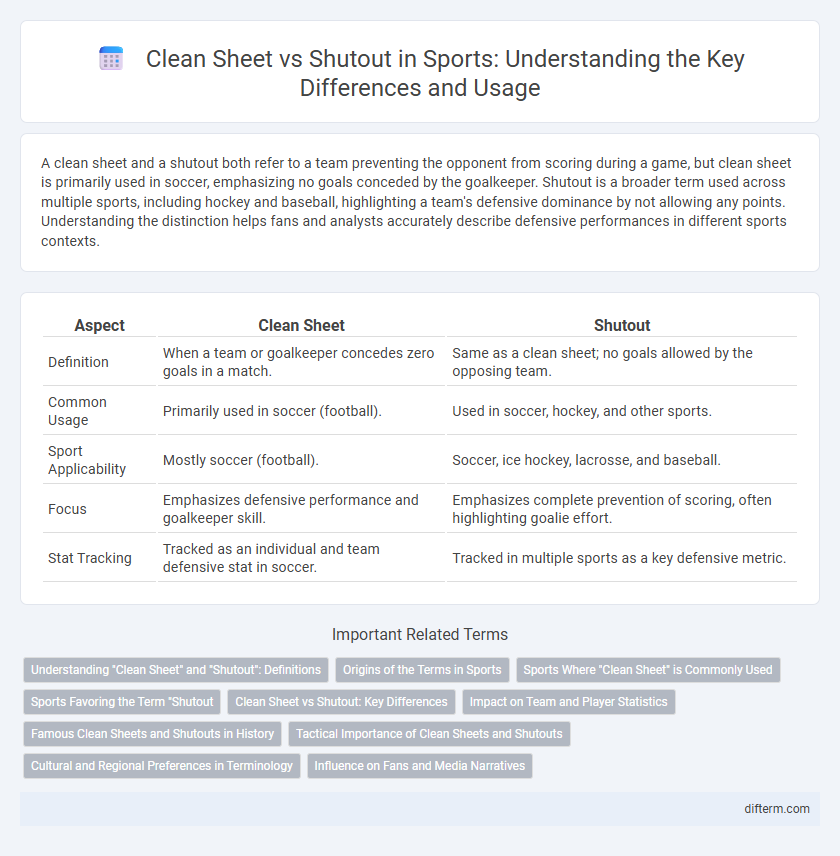A clean sheet and a shutout both refer to a team preventing the opponent from scoring during a game, but clean sheet is primarily used in soccer, emphasizing no goals conceded by the goalkeeper. Shutout is a broader term used across multiple sports, including hockey and baseball, highlighting a team's defensive dominance by not allowing any points. Understanding the distinction helps fans and analysts accurately describe defensive performances in different sports contexts.
Table of Comparison
| Aspect | Clean Sheet | Shutout |
|---|---|---|
| Definition | When a team or goalkeeper concedes zero goals in a match. | Same as a clean sheet; no goals allowed by the opposing team. |
| Common Usage | Primarily used in soccer (football). | Used in soccer, hockey, and other sports. |
| Sport Applicability | Mostly soccer (football). | Soccer, ice hockey, lacrosse, and baseball. |
| Focus | Emphasizes defensive performance and goalkeeper skill. | Emphasizes complete prevention of scoring, often highlighting goalie effort. |
| Stat Tracking | Tracked as an individual and team defensive stat in soccer. | Tracked in multiple sports as a key defensive metric. |
Understanding "Clean Sheet" and "Shutout": Definitions
A "clean sheet" refers to a soccer team preventing the opposition from scoring any goals during a match, emphasizing defensive success and the goalkeeper's role. In contrast, a "shutout" is primarily used in sports like hockey and baseball, indicating that one team or player does not allow the opposing team to score any points or runs. Both terms highlight a flawless defensive performance, but they apply to different sports with slightly varied nuances.
Origins of the Terms in Sports
The term "clean sheet" originated in British football, where the goalkeeper's record was historically noted on a sheet of paper kept free of goals conceded. "Shutout" comes from North American sports like hockey and baseball, signifying a game where one team prevents the opponent from scoring entirely. Both terms emphasize defensive success but reflect different cultural and linguistic roots within the sporting world.
Sports Where "Clean Sheet" is Commonly Used
In soccer and field hockey, a clean sheet refers to a game where the goalkeeper or team prevents the opposing side from scoring any goals. This term is widely used in these sports to highlight defensive success and goalkeeping excellence. Conversely, shutout is more common in North American sports like ice hockey and baseball to denote a similar defensive achievement.
Sports Favoring the Term "Shutout
In ice hockey and baseball, the term "shutout" is favored to describe a game where one team prevents the opposing team from scoring any points, highlighting defensive dominance. A shutout emphasizes complete control over the opponent's offense, a crucial metric in evaluating goalkeepers in hockey and pitchers in baseball. Unlike "clean sheet," which is primarily used in soccer, shutout underscores defensive prowess across multiple sports with similar scoring dynamics.
Clean Sheet vs Shutout: Key Differences
Clean sheet and shutout both refer to preventing the opposing team from scoring, but clean sheet is commonly used in soccer while shutout is prevalent in ice hockey and baseball. A clean sheet emphasizes the goalkeeper's and defense's ability to maintain a scoreless game, whereas a shutout reflects the overall team's defensive success in various sports. Understanding these terms helps clarify performance metrics across different sports disciplines.
Impact on Team and Player Statistics
Clean sheets and shutouts both signify a match without conceding goals, crucial for evaluating a team's defensive strength and a goalkeeper's performance. Maintaining a clean sheet or shutout enhances team confidence, improves league standings, and often correlates with higher win rates, reflecting defensive discipline and effective coordination. For players, especially goalkeepers and defenders, these statistics boost individual records, influence contract negotiations, and increase their market value within the sports industry.
Famous Clean Sheets and Shutouts in History
Famous clean sheets and shutouts in sports history highlight legendary defensive performances, such as Walter Zenga's record 517-minute unbeaten run as Italy's goalkeeper during the 1990 World Cup or the Chicago Blackhawks' 2010 Stanley Cup-winning shutout by Antti Niemi in Game 6. These moments showcase exceptional team coordination and individual skill, where clean sheets and shutouts have cemented athletes' legacies by preventing opponents from scoring entirely. Such historic achievements remain benchmarks in soccer, hockey, and football, inspiring defensive excellence worldwide.
Tactical Importance of Clean Sheets and Shutouts
Clean sheets and shutouts are critical tactical metrics in sports, especially in soccer and hockey, emphasizing a team's defensive strength and organization. Maintaining a clean sheet often reflects effective communication and disciplined positioning among defenders and goalkeepers, directly reducing the opponent's scoring opportunities. Shutouts contribute significantly to a team's strategic approach by fostering confidence, allowing more aggressive offensive tactics without compromising defensive stability.
Cultural and Regional Preferences in Terminology
In soccer, the term "clean sheet" is predominantly used in the United Kingdom and other Commonwealth countries to indicate a game where the goalkeeper concedes no goals. In contrast, "shutout" is favored in North American sports contexts, including hockey and soccer, reflecting regional linguistic preferences. These variations highlight how cultural influences shape sports terminology and communication styles across different English-speaking regions.
Influence on Fans and Media Narratives
A clean sheet in soccer and a shutout in hockey both signify a game where the opposing team fails to score, heavily influencing fan enthusiasm and media narratives by highlighting defensive strength and goalkeeper excellence. These defensive feats often become central talking points, boosting player reputations and framing team strategies in pre- and post-game analyses. Such performances energize fan bases, fostering pride and loyalty while shaping media coverage with narratives of dominance and resilience.
clean sheet vs shutout Infographic

 difterm.com
difterm.com